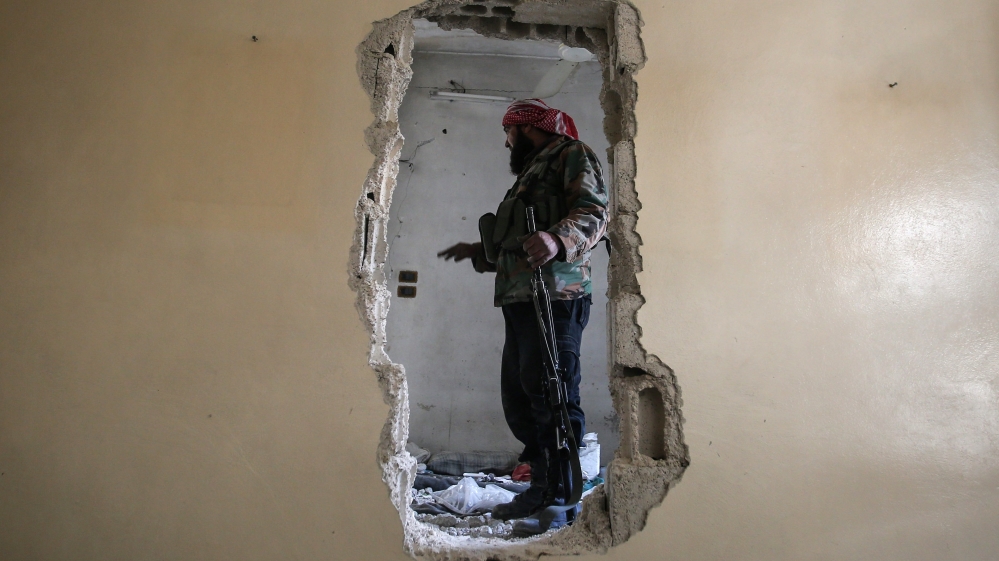Al Jazeera
The Syrian army and allied armed groups have started moving large numbers of troops to a desert region on the country's border with Iraq and Jordan as US-backed rebels make advances nearby, according to rebel sources.
Speaking to the Reuters news agency on Monday, rebel sources and commanders said that hundreds of Syrian soldiers and fighters from Iranian-backed militias have in recent days poured into the town of Sabaa Biyar, located in a sparsely-populated desert territory that stretches to the Jordanian and Iraqi border known as the Syrian Badia.
In recent weeks, US-backed Free Syrian Army (FSA) fighters had been advancing in the area, from which the Islamic State of Iraq and the Levant (ISIL, also known as ISIS) recently pulled out.
Sabaa Biyar, a remote town near the strategic Damascus-Baghdad highway, was captured by the army and its allies last week as they seek to prevent areas left by ISIL from falling into the hands of Western-backed rebels such as the FSA.
"They have sent big reinforcements from artillery, to tanks and armoured vehicles," Major Issam Al Reis, the spokesperson for FSA's Southern Front group, told Reuters.
The Syrian army was not immediately available for comment.
Syria's military has been alarmed by two months of FSA advances against ISIL that allowed the rebels to secure a large swathe of sparsely-populated territory stretching from the town of Bir Qassab, some 50km southeast of Damascus, all the way to the borders with Iraq and Jordan.
"The regime's plan is to reach the Iraqi-Syrian border and cut the road on our advance further towards the north east against [ISIL's] strongholds there after they lost territory in the Badia," Reis said.
Syrian government fighter jets struck rebel outposts near the borders with Jordan and Iraq last Tuesday, while over the past few days they stepped up surveillance missions in the Badia and struck rebel outposts in the town of Bir Qassab.
Jordan alarmed
The push by the Syrian army and its Iranian-backed allies could risk bringing them to close to the Tanf base near the Iraqi border, where US special forces operate and train FSA rebels, rebels told Reuters.
Yet, the presence of Iranian-backed fighters from Iraq and Lebanon's Hezbollah in that area has alarmed Jordan, a US ally, which backs rebel groups.
Jordanian Foreign Minister Ayman Safadi said the kingdom did not accept the presence of pro-government armed groups as much they fought the threat of the groups such as ISIL.
The kingdom has long been trying to prevent opposition-held southern Syria from falling to ISIL.
Rebels say the ultimate goal of the Syrian army's push in the Badia was to link its forces with Iraq's paramilitary groups on the other side of the border.
The Damascus-Baghdad highway was a major weapons supply route for Iranian weapons into Syria until ISIL seized large territory along the Iraqi Syrian border, according to regional intelligence sources.
Rebels say they have this week to target outposts they believed were manned by militias backing the government of Bashar al-Assad.
"The Syrian desert will not accept new occupiers it got rid of Baghdadi's caliphate (ISIL head) not so that Iran's terrorist militias take its place. It is our strategic depth," said Captain Ahmed Tamer, the head of the Ahmed Abdo Martyrs Forces.
Rebel evacuations
Elsewhere in Syria, the government and rebels have reached population transfer agreements where rebels and their families are besieged and then evacuated to Idlib, an opposition stronghold.
On Sunday, around 1,500 rebels and their families were moved from the Damascus neighbourhood of Qaboun after years of controlling the area. Backed into a corner as Syrian government forces besieged them, the rebels agreed to move to Idlib.
The loss of Qaboun followed the fall of Barzeh, another neighbourhood rebels recently left, and is another blow to rebels as they battle to keep a foothold in the capital and face government troops who are supported by Russian air power and Iranian-backed militias.
Assad has promoted the use of such evacuations, along with what his government calls "reconciliation" deals for rebel-held areas that surrender to the government, as a way of reducing bloodshed in the six-year-old civil war.
However, the United Nations has criticised both the use of siege tactics, which precede such deals, and the evacuations themselves as amounting to forcible displacement.
The Syrian army has been steadily defeating pockets of rebellion near the capital, with the help of Russian air power and Iranian-backed armed groups.

